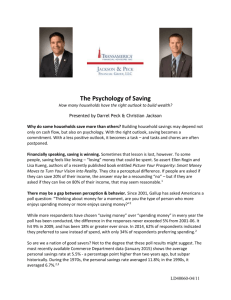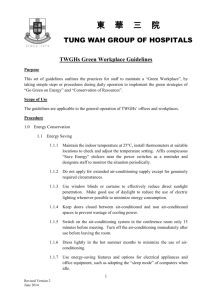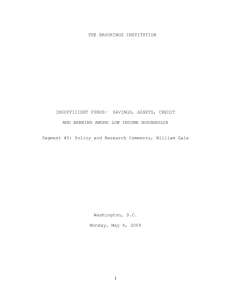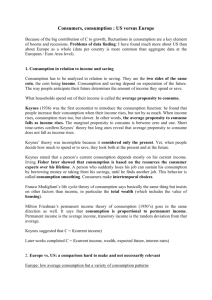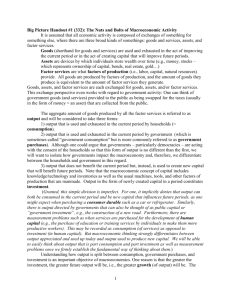Statement from the Energy and Climate Working Group (doc.)
advertisement
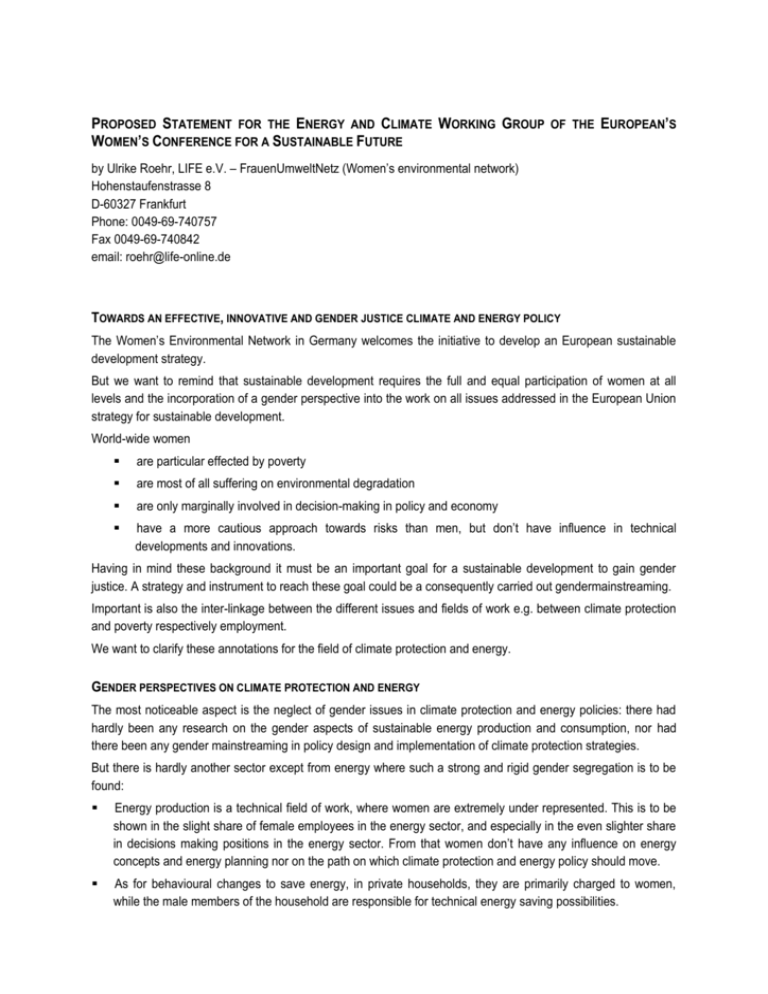
PROPOSED STATEMENT FOR THE ENERGY AND CLIMATE WORKING GROUP OF THE EUROPEAN’S WOMEN’S CONFERENCE FOR A SUSTAINABLE FUTURE by Ulrike Roehr, LIFE e.V. – FrauenUmweltNetz (Women’s environmental network) Hohenstaufenstrasse 8 D-60327 Frankfurt Phone: 0049-69-740757 Fax 0049-69-740842 email: roehr@life-online.de TOWARDS AN EFFECTIVE, INNOVATIVE AND GENDER JUSTICE CLIMATE AND ENERGY POLICY The Women’s Environmental Network in Germany welcomes the initiative to develop an European sustainable development strategy. But we want to remind that sustainable development requires the full and equal participation of women at all levels and the incorporation of a gender perspective into the work on all issues addressed in the European Union strategy for sustainable development. World-wide women are particular effected by poverty are most of all suffering on environmental degradation are only marginally involved in decision-making in policy and economy have a more cautious approach towards risks than men, but don’t have influence in technical developments and innovations. Having in mind these background it must be an important goal for a sustainable development to gain gender justice. A strategy and instrument to reach these goal could be a consequently carried out gendermainstreaming. Important is also the inter-linkage between the different issues and fields of work e.g. between climate protection and poverty respectively employment. We want to clarify these annotations for the field of climate protection and energy. GENDER PERSPECTIVES ON CLIMATE PROTECTION AND ENERGY The most noticeable aspect is the neglect of gender issues in climate protection and energy policies: there had hardly been any research on the gender aspects of sustainable energy production and consumption, nor had there been any gender mainstreaming in policy design and implementation of climate protection strategies. But there is hardly another sector except from energy where such a strong and rigid gender segregation is to be found: Energy production is a technical field of work, where women are extremely under represented. This is to be shown in the slight share of female employees in the energy sector, and especially in the even slighter share in decisions making positions in the energy sector. From that women don’t have any influence on energy concepts and energy planning nor on the path on which climate protection and energy policy should move. As for behavioural changes to save energy, in private households, they are primarily charged to women, while the male members of the household are responsible for technical energy saving possibilities. Comments Strategy for Sustainable Development 2 These strong gender segregation has again effects on women: Generally women have a more developed environmental awareness and also environmental behaviour than men. However, at the same time they have a lower environmental knowledge and especially a lack of information on questions of climate change, energy economy and energy techniques – maybe because of their lack of technical education, but also because technical information is not prepared to be readily comprehensible for non-technicians. The shift of responsibility for energy saving into private households (energy saving washing and drying and so on) is linked with a “feminisation of responsibility” because of the traditional share of unpaid domestic work. To run the household environmental friendly and energy saving is more time-consuming. This additional work is not shared out in a just way to the male and female members of the household but burdened mostly to the women. But their responsibility and daily-life knowledge doesn’t lead to a stronger influence in development and production of technical and electrical appliances for households. The deregulation of the energy market effects the employment of women in these sector in a negative way as a study from Eurelectric shows. And they don‘t profit from the advantages because of a lack of information on the complicated tariff structures (women change suppliers less frequently than men) Energy taxes affect women much harder than man because of their smaller income (Women in Europe earn in the average 2/3 of the money men earn. Especially older women suffer on small pensions often under the subsistence level) Positive effects of climate protection measures on the employment don’t meet women. Most of the new jobs are found in the construction sector where the share of women is very low. So women have to carry the burdens of climate protection policies but don’t profit from new jobs created by it. Energy production and energy use are often associated by women with security and health risk. Therefore they are much more opposed to nuclear energy use than men. Latest studies (1999) from Finland show that only 16 percent of the women support nuclear power, whereas 46 percent of the men favour it. RECOMMENDATIONS Gender justice is an essential element of a sustainable development strategy. To reach this goal a gender perspective has to be incorporated into the work on all issues regarding sustainable development. Which means for energy and climate change issues: 1. An important requirement for all further activities on gender and climate protection/energy is a gender differentiated data- and research base For the field of education and employment this means: In which fields, on which levels of the energy sector are women employed? How can they be motivated for apprenticeships and education in energy technologies or energy economy? But also: How should courses of studies and working conditions in the energy industry be changed to make them interesting for women? A database is also required for the whole field of energy use and energy consumption: Who is using how much energy and for which purpose? Who is buying and using electrical appliances, and why? Is it for spending the leisure time , for education or information, or for caring work? Comments Strategy for Sustainable Development 3 Gender disaggregated data should also be put on disposal or utilised in the field of environmental awareness, environmental behaviour and environmental information – especially concerning the energy sector. This are just some examples, whereas the list of inevitable data could be continued. Basically the first step could be a law like the regulation in Sweden which stipulates all data ascertained referring to persons to be disaggregated in an gender differentiated way. 2. Very often, the responsibility for production is attributed to women because of their “consumer power”. This is valid for the energy sector as well as for all other consumption sectors. Which means: if women (and men) make the proper environmental friendly purchase decisions, the industry will follow and change their production, producing environmental friendly products, removing environmental harmful products from the market. Possibly this consumers power is absolutely overvalued, but apart of this the more direct way to a sustainable consumption and energy use would be to take influence on production itself: Political regulations and instruments will be one way to shift the responsibility from consumer to producer. They must be translated into action by the industry, using policy instruments like efficiency standards, and introducing intelligent functions for all electrical appliances, The direct involvement of women into development and design of products will be another way. They can answer the questions: do we want this product or application, is it useful or helpful, does it meet our requirements? 3. However, private households are responsible for a considerable part of the energy consumption. The acceptance of this responsibility by women is opposed to the lack of information on energy issues and often by a financial lack. The lack of information of women must be minimised by target group specific offers of information and consulting. Which means different offers for education, consulting or information materials (leaflets...) must be developed, which are suited to the different situations and previous knowledge of women. These offers could provide the possibility to reach women who have low interest in energy issues. Financial gains through energy conservation, by means of subsidies for the purchase of energy saving appliances, or tariff structures encouraging energy saving, will motivate and support women with low incomes to save energy. As yet, the price for a unit of energy is higher the less energy is used – this correlation tends to be increasing in the course of the liberalisation of the electricity market. Also financial gains for energy saving appliances are phased out. It needs discussion and new concepts to stop this development. 4. The deregulation of the electricity market was introduced to break energy monopolies and to allow customers to choose their electricity supplier. But without political regulations it leads to an even stronger monopolisation and centralisation of the energy production. The deregulation effects the anyway marginal representation of women in decision-making and their possibilities to get influence in a negative way. But even with a change of energy production to a more ecological way, which means in a path of decentralisation and increased use of renewable energy, it isn’t easy for women to get their place in these economy sector. That’s what we learned from experience in the last 20 years. Although women support this Comments Strategy for Sustainable Development 4 “soft energy path”, they lack of some important preconditions: firstly, of interest in energy issues, secondly, the technical know how, and thirdly the required money (capital for investment). Without interventions regulating the liberalisation, without measures and programs to promote women in the field of energy production – whether it’s conventional or renewable –, without giving men an alternative to their 24hour-7days a week-jobs, men will not voluntarily share their power with women. 5. To break the vicious circle between non-acceptance of the issue “women and energy” and the lack of data and research there is a strong need for gender specific research in the energy sector. This regards principally all areas of the issues energy and climate protection: It should begin with studies on access of women and girls to these fields, go on with studies on energy consumption and its gender specific implications, and come to the effects of energy policy and climate protection policy. For example, the effect of eco taxes on women respectively on the gender relation should be analysed before introducing them. But not only gender specific research should be undertaken: it must be guaranteed that all research projects in the field of energy policy and energy economy integrate gender questions into their work. That’s the only way to get a broad database and discussion. 6. This research would prepare the ground for gendermainstreaming and gender impact assessment in the energy sector. Today, the ignorance of planners about gender aspects hampers such approaches. Planners and decision-makers need to take notice of improved data bases and to learn about the results of genderresearch. A method for sensitisation could be gender trainings that should be attended especially by decision-makers within every energy policy and planning related institution and organisation. A further step into the right direction might be to work out guidelines to simplify, standardise and operationalise policies that take gender aspects into consideration. Finally, over all, there must be the strong political intention to set the gendermainstreaming in the energy sector into practice.



